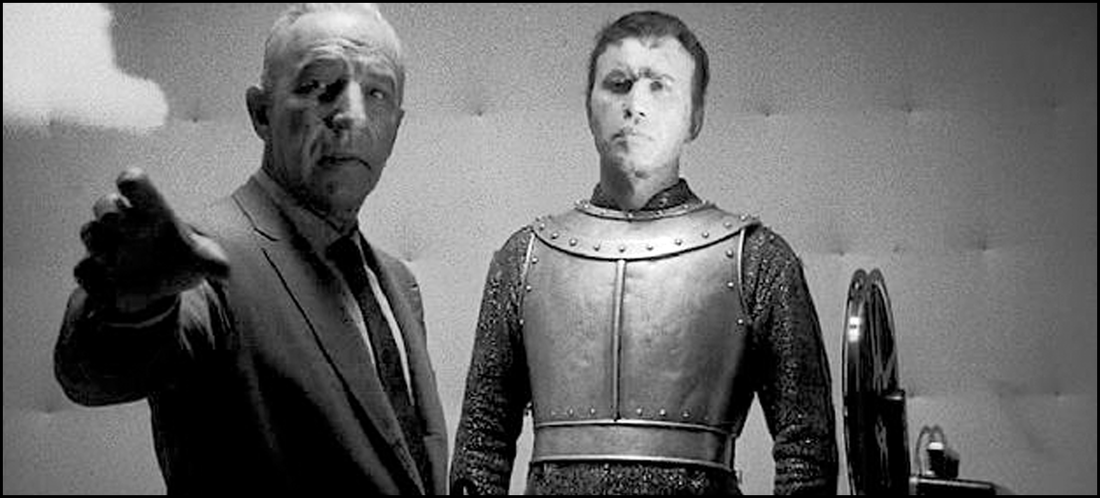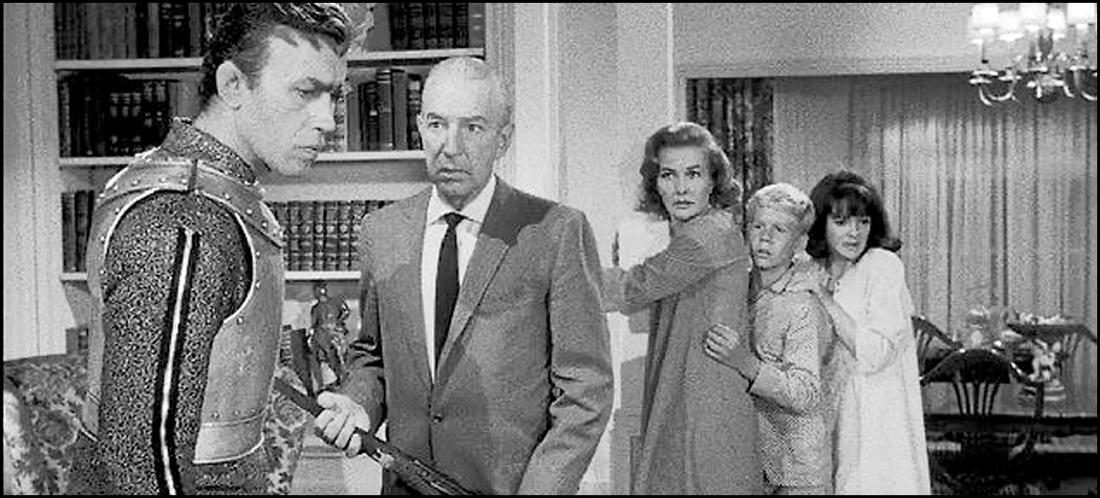Unlike today, there’s a vast library of broadcast programming out there that wasn’t written to spur audiences to activism. Production executives weren’t always interested in representing key demographics or minority groups with members of their cast. More often than not, storytellers were merely working to sling words together on a page – giving it a serviceable beginning, middle, and ending that could fit within an episode’s budget – so trying to affect the viewers’ minds about some controversial or timely topic of dinner table conversation was likely backburnered as a network priority. Instead, the focus was on telling a good story – maybe even a damn good one – and leave the lesson planning to the teachers.
In fact, even the commentary track on the 2018 Kino Lorber release for The Outer Limits: Season 2 suggests just how different the network shenanigans back then differ from today. Film historian and author David J. Schow provides the reflections specifically to “Soldier” as well as some insights into the show’s behind-the-scenes pressures, and he remarks how the network suits demanded monsters to appear every so many minutes in each typical one-hour installment. (Apparently, these folks had done their research, and their findings convinced them that audiences only wanted monsters.) Story wasn’t all that important … so long as it provided a greater context for monsters.
Well, “Soldier” has a monster. Of a sort. If you can believe it, we’re the monster. Man. All of us.
But I’ll get to that in a moment.
The point I raised in this article’s outset remains: because yesterday’s entertainment largely lacked the complex ideological agendas that today’s purveyors of media typically embrace, I’m occasionally flummoxed over having something to say about a show that, frankly, hasn’t been said already in the decades since its original airing.
This isn’t to say that Ellison didn’t have a ‘moral to the story.’ He did. (Well, I’d like to think he did.) His anti-war stance was, likely, plain as day back then as it is now. Also, one could argue that the screenwriter gave a pronounced and favorable nod to the benefits of the nuclear family – were one so inclined to interpret those 51 minutes in such a way. Heck, a case could even be made that “Soldier” suggests the care and evaluation of returning soldiers should be placed in the hands of independent, unbiased, non-governmental mental health and wellness providers – scientists well outside the military industrial complex of that era – if you’re watching closely.
As is often the case, we take exactly what meaning we want from art, but I’ve long argued that shows from yesteryear left room for folks of all political stripes – not just the institutional Right or Left, the Liberal or Conservative – to find commonality, a sentiment I fear lost on today’s scribes. Thus, “Soldier” represents the very best of us – a desire to seek and find answers even to life’s most daunting challenges – as much as it represents the very worst of us – a demonstrated proclivity to wage war, even if the combatants cannot articulate what they’re fighting for.
As Quarlo Clobregnny, the great Michael Ansara played a soldier wrapped up in a very different kind of war than the one for which he was originally trained: a survival beyond the battlefield. It would appear no thought was ever given to what an existence outside of bloodshed might be. Ellison’s total immersion of this warrior into the (somewhat) peaceful past – into an period devoid of legitimate physical aggression for his outlet – creates an all-new and insurmountable conflict. Without the preparation for setting aside his bloodlust, Quarlo cannot relate in any useful way upon arrival; and – depending upon one’s interpretation, again – he succumbs to his original programming in the hour’s final moment. Violence remains his “true north” – if you’re familiar with the expression – as well as his last resort.
So … we made the monster, and the monster is us.
Dare I suggest this isn’t likely the “monster” the studio executives were anticipating?
Ultimately, what I find so impressive about “Soldier” is the choice of protagonist.
It’s a matter of public record that Ellison’s short story – “Soldier From Tomorrow” – was first published in the October, 1957 issue of Fantastic Universe. For those who’ve missed ‘50’s and early ‘60’s television, the going trend leaned heavily on Westerns, private detectives, cop shows, and the like; so adapting a somewhat cerebral tale focusing on a philologist thrown into a conflict between two enemy combatants likely gave some network executives pause. The typical heroes of this era weren’t so much revered for their brains as they were their instincts, and they often packed heat (carried guns) or had to pass regular physicals to keep their employment. Lloyd Nolan’s ‘Tom Kagan’ comes across far more grandfatherly than he does anything resembling a stout authoritarian, and he solves the world’s problems with his mind.
Having watched as much older Science Fiction as I have, I can assure you that, typically, scientists have enjoyed a myriad of depictions. There have been good ones, and there have been bad ones. Indeed, they’re probably shown to have caused as many problems as they’ve solved, and the Atomic Age certainly presented these brainiacs with an all-new set of experiments to perform. On film, some of them unleashed giant insects that went marauding across the amber waves of grain while others went about using new these forms of energy to reanimate the dead. Imagine my surprise to find out that somewhere out there might be a fellow like Kagan – a guy whose chief motivation is that he, simply put, just cared?
In many ways, “Soldier” ends as it began: two men are thrown together in mortal combat.
Sides don’t matter. Stakes are never discussed. Objectives never come into discussion. This is a world of kill or be killed, and these two are functioning at peak condition. One smokes a cigarette in a moment of calm while the other sucks medicine (drugs? liquid smoke?) from a handheld device. All they know is violence. All they serve are their respective masters. Science may’ve played a hand in their training and even in their unintentional trip through time, but it was raw human savagery – and the working end of a laser rifle – that defined their final moments alive. Whether or not Quarlo matured in some way, discovered his latent humanity, and sacrificed his life protecting the Kagan family is a question we’ll never answer definitively, certainly not with the evidence as presented.
As I said above, we take what messages we want from art, and I suspect you’ll have to do the same here.
-- EZ



 RSS Feed
RSS Feed